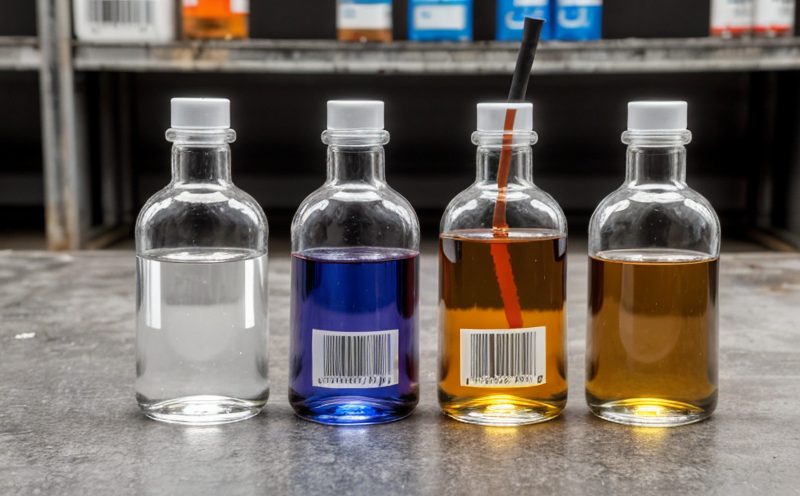EN ISO 1817 Chemical Stability Testing of Vulcanized Rubber
The EN ISO 1817 standard is a crucial guideline for ensuring the long-term performance and reliability of vulcanized rubber products. This comprehensive testing procedure evaluates how chemical stability affects the durability, functionality, and safety of these materials over time under various environmental conditions.
Vulcanized rubber finds extensive use in industries such as automotive, aerospace, and construction due to its excellent mechanical properties like high tensile strength, flexibility, and elasticity. However, exposure to chemicals, heat, light, ozone, and other environmental factors can degrade these materials over time, leading to a loss of functionality or performance.
EN ISO 1817 provides a standardized method for assessing the chemical stability of vulcanized rubber by exposing samples to specific chemical environments. The testing process simulates real-world conditions that might cause degradation and helps manufacturers understand how their products will behave in different scenarios.
The test procedure involves several critical steps, including the preparation of specimens according to ISO standards, exposure of these specimens to various chemicals under controlled temperature and humidity levels, observation over a specified period, and analysis of any changes observed. This ensures that the results are reliable and comparable across different laboratories.
Understanding the chemical stability of vulcanized rubber is essential for several reasons:
- Product Safety: Ensuring that materials do not release harmful chemicals into environments where they are used.
- Performance Consistency: Maintaining consistent product quality and reliability over time and across different applications.
- Regulatory Compliance: Meeting international standards to ensure products meet environmental, health, and safety regulations.
The testing process is not only beneficial for manufacturers but also for end-users who rely on the long-term performance of these materials. By adhering to EN ISO 1817, industries can enhance their reputation by demonstrating a commitment to quality and reliability.
| Industry | Product Type | Environmental Exposure | Testing Method |
|---|---|---|---|
| Automotive | Tire components, hoses, seals | Ozone, heat, humidity | Vacuum chamber with controlled chemical exposure |
| Aerospace | Gasket materials, rubber bands | UV light, high altitude conditions | Sunlight simulator and pressure chamber |
| Construction | Rubber seals, roofing materials | Weathering agents, biological contaminants | Exposure to real-world weather conditions in a controlled setting |
The results of EN ISO 1817 testing are used by manufacturers and industry professionals to make informed decisions about the chemical composition, processing methods, and final product design. Understanding these factors allows for the development of more durable and reliable products that can withstand harsh environments.
Industry Applications
| Industry | Product Type | Environmental Exposure | Testing Method |
|---|---|---|---|
| Automotive | Tire components, hoses, seals | Ozone, heat, humidity | Vacuum chamber with controlled chemical exposure |
| Aerospace | Gasket materials, rubber bands | UV light, high altitude conditions | Sunlight simulator and pressure chamber |
| Construction | Rubber seals, roofing materials | Weathering agents, biological contaminants | Exposure to real-world weather conditions in a controlled setting |
The application of EN ISO 1817 is not limited to just these industries. It also extends to other sectors such as medical devices, where rubber components must maintain their integrity and safety over time.
Understanding the chemical stability of vulcanized rubber is essential for several reasons:
- Product Safety: Ensuring that materials do not release harmful chemicals into environments where they are used.
- Performance Consistency: Maintaining consistent product quality and reliability over time and across different applications.
- Regulatory Compliance: Meeting international standards to ensure products meet environmental, health, and safety regulations.
Eurolab Advantages
At Eurolab, our commitment to excellence in chemical stability testing is reflected in the quality of our facilities, experienced personnel, and cutting-edge technology. Our state-of-the-art laboratory ensures that we can replicate real-world conditions with precision, providing accurate and reliable results.
We offer a range of services tailored to meet your specific needs, including:
- Comprehensive Testing: Full analysis of chemical stability under various environmental stressors.
- Rapid Turnaround: Efficient testing processes that deliver results faster than competitors.
- Expert Guidance: Access to our team of specialists who can provide insights and recommendations based on test outcomes.
Eurolab's reputation for accuracy, reliability, and consistency is built on years of experience in the field. We are dedicated to helping you achieve your testing objectives with precision and efficiency.
Customer Impact and Satisfaction
Eurolab's chemical stability testing services have a direct impact on customer satisfaction by ensuring that products meet the highest quality standards. Our rigorous testing processes help manufacturers identify potential issues early in the development process, allowing for timely corrections and improvements.
By adhering to international standards like EN ISO 1817, we contribute to the global effort towards sustainability and safety. This not only enhances our clients' reputation but also ensures compliance with regulatory requirements worldwide.
Our customers have consistently praised Eurolab for its reliability and expertise. They appreciate the detailed reports that provide valuable insights into product performance and durability under various conditions.





